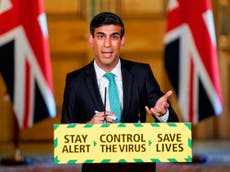People are using illegal drugs to help them cope with the mental distress of lockdown
With NHS mental health services in retreat, the outlook is bleak for anyone who develops a dependency during these uncertain times

Necessity, rather than choice, has prompted some into “do it yourself” healthcare during the Covid-19 crisis. Thankfully dentists are opening again, so people don’t have to pick up a set of pliers to relieve toothache. But we’re beginning to get some insights into how people in lockdown are dealing with other aspects of our wellbeing – mental health in particular.
These insights have been provided not by mental health services, who have recorded a downturn in referrals since the outbreak of coronavirus, but from a recent survey of illegal drug use. Although there have been a few surveys of drug use by various organisations, this survey not only asks which drugs people are using but crucially why they are taking them.
The majority of respondents (71 per cent) report using drugs for fun or as a way of relaxing – an important reminder that most people still use drugs for pleasure, a factor often overlooked as media reporting of drugs is usually related to overdose, or some other adverse aspect of drug use. That is also reflected in academic research, where investigations are skewed towards better understanding problem drug use. If you have no experience of drugs, you’d be forgiven for assuming that it’s an activity that’s very high risk, creating all manner of personal problems for the individual using them. But that’s not the case for most people who take drugs.
What seems to have changed for drug users in recent months is a significant rise in those reporting using drugs to help cope with mental health problems – up from approximately one in five prior before the coronavirus outbreak to one in two during the pandemic. The type of mental health problems identified by respondents are anxiety, escaping reality, stress or loneliness. Understandably, given the uncertainty of what lies ahead, and some will also be struggling with money, relationships, self confidence and mood.
These are the problems that mental health services are meant to treat. But rather than reaching out to those in need, they have been in retreat during Covid-19, prioritising only the most acutely ill and leaving everyone else to fend for themselves.
Without any idea of when, or if, they will ever get help with the mental health problems they are experiencing, some of these people inevitably turn to drugs.
This isn’t as reckless or foolhardy as it may initially seem. Some drugs do alleviate many of the symptoms that people struggle with. The problem is there is no guarantee that they will offer relief for everyone, and it can be difficult to judge the correct dose of a drug that doesn’t then risk some other adverse problem such as respiratory failure. Equally, it doesn’t take long to develop a physical and psychological dependence on many drugs, compounding to the mental health problems these people are trying to treat.
Even if they recognise and admit having developed a dependence on a drug due to a mental health problem, their motivation and psychological ability to tackle dependence may well be compromised. Withdrawal can then include anxiety, sleep disruption, low mood and agitation – the very same symptoms they turned to drugs to seek relief from.
The outlook for those small number of users who have developed a dependency in lockdown is, I’m afraid, bleak. Any hope that professional support will emerge as restrictions are lifted is a fantasy. The UK’s burgeoning debt will see services continue to prioritise only those who are in acute mental health crisis as the public purse is tightened and budgets cut. Of those, it will be the people deemed to pose a risk to the wider community who will receive a timely intervention, despite the greatest risk of mental illness always being self-harm or suicide, rather than harm to others.
Far from being exceptional, the way mental health services have been provided during Covid-19 will become the new normal. We are witnessing the contraction of state services for all but the most acutely ill.
In this new world, self-medicating with illegal drugs may be the only option many will have. After all, drugs are easy to access and offer instant relief – the polar opposite of what is provided by state run mental health services.
Ian Hamilton is a lecturer in mental health at the University of York




Join our commenting forum
Join thought-provoking conversations, follow other Independent readers and see their replies